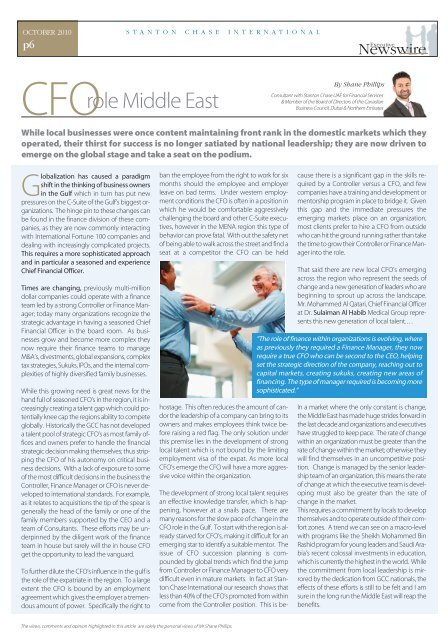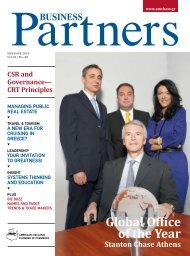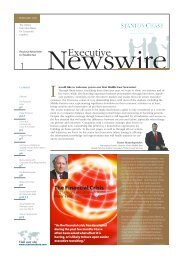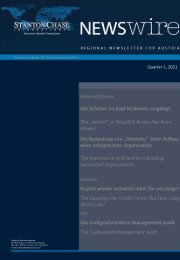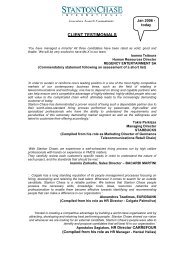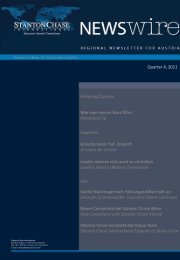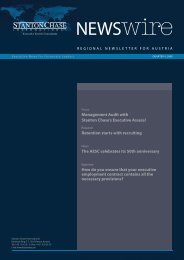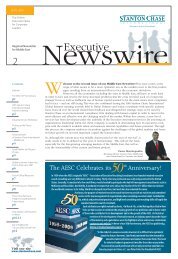WORLD ECONOMY - Stanton Chase
WORLD ECONOMY - Stanton Chase
WORLD ECONOMY - Stanton Chase
Create successful ePaper yourself
Turn your PDF publications into a flip-book with our unique Google optimized e-Paper software.
OCTOBER 2010<br />
p6<br />
CFOrole Middle East<br />
Globalization has caused a paradigm<br />
shift in the thinking of business owners<br />
in the Gulf which in turn has put new<br />
pressures on the C-Suite of the Gulf’s biggest organizations.<br />
The hinge pin to these changes can<br />
be found in the finance division of these companies,<br />
as they are now commonly interacting<br />
with International Fortune 100 companies and<br />
dealing with increasingly complicated projects.<br />
This requires a more sophisticated approach<br />
and in particular a seasoned and experience<br />
Chief Financial Officer.<br />
Times are changing, previously multi-million<br />
dollar companies could operate with a finance<br />
team led by a strong Controller or Finance Manager;<br />
today many organizations recognize the<br />
strategic advantage in having a seasoned Chief<br />
Financial Officer in the board room. As businesses<br />
grow and become more complex they<br />
now require their finance teams to manage<br />
M&A’s, divestments, global expansions, complex<br />
tax strategies, Sukuks, IPOs, and the internal complexities<br />
of highly diversified family businesses.<br />
While this growing need is great news for the<br />
hand full of seasoned CFO’s in the region, it is increasingly<br />
creating a talent gap which could potentially<br />
knee cap the regions ability to compete<br />
globally. Historically the GCC has not developed<br />
a talent pool of strategic CFO’s as most family offices<br />
and owners prefer to handle the financial<br />
strategic decision making themselves; thus stripping<br />
the CFO of his autonomy on critical business<br />
decisions. With a lack of exposure to some<br />
of the most difficult decisions in the business the<br />
Controller, Finance Manager or CFO is never developed<br />
to international standards. For example,<br />
as it relates to acquisitions the tip of the spear is<br />
generally the head of the family or one of the<br />
family members supported by the CEO and a<br />
team of Consultants. These efforts may be underpinned<br />
by the diligent work of the finance<br />
team in house but rarely will the in house CFO<br />
get the opportunity to lead the vanguard.<br />
To further dilute the CFO’s influence in the gulf is<br />
the role of the expatriate in the region. To a large<br />
extent the CFO is bound by an employment<br />
agreement which gives the employer a tremendous<br />
amount of power. Specifically the right to<br />
S T A N T O N C H A S E I N T E R N A T I O N A L<br />
ban the employee from the right to work for six<br />
months should the employee and employer<br />
leave on bad terms. Under western employment<br />
conditions the CFO is often in a position in<br />
which he would be comfortable aggressively<br />
challenging the board and other C-Suite executives,<br />
however in the MENA region this type of<br />
behavior can prove fatal. With out the safety net<br />
of being able to walk across the street and find a<br />
seat at a competitor the CFO can be held<br />
hostage. This often reduces the amount of candor<br />
the leadership of a company can bring to its<br />
owners and makes employees think twice before<br />
raising a red flag. The only solution under<br />
this premise lies in the development of strong<br />
local talent which is not bound by the limiting<br />
employment visa of the expat. As more local<br />
CFO’s emerge the CFO will have a more aggressive<br />
voice within the organization.<br />
The development of strong local talent requires<br />
an effective knowledge transfer, which is happening,<br />
however at a snails pace. There are<br />
many reasons for the slow pace of change in the<br />
CFO role in the Gulf. To start with the region is already<br />
starved for CFO’s, making it difficult for an<br />
emerging star to identify a suitable mentor. The<br />
issue of CFO succession planning is compounded<br />
by global trends which find the jump<br />
from Controller or Finance Manager to CFO very<br />
difficult even in mature markets. In fact at <strong>Stanton</strong><br />
<strong>Chase</strong> International our research shows that<br />
less than 40% of the CFO’s promoted from within<br />
come from the Controller position. This is be-<br />
Executive<br />
Newswire<br />
By Shane Phillips<br />
While local businesses were once content maintaining front rank in the domestic markets which they<br />
operated, their thirst for success is no longer satiated by national leadership; they are now driven to<br />
emerge on the global stage and take a seat on the podium.<br />
The views, comments and opinion highlighted in this article are solely the personal views of Mr Shane Phillips.<br />
Consultant with <strong>Stanton</strong> <strong>Chase</strong> UAE for Financial Services<br />
& Member of the Board of Directors of the Canadian<br />
Business Council, Dubai & Northern Emirates<br />
cause there is a significant gap in the skills required<br />
by a Controller versus a CFO, and few<br />
companies have a training and development or<br />
mentorship program in place to bridge it. Given<br />
this gap and the immediate pressures the<br />
emerging markets place on an organization,<br />
most clients prefer to hire a CFO from outside<br />
who can hit the ground running rather than take<br />
the time to grow their Controller or Finance Manager<br />
into the role.<br />
That said there are new local CFO’s emerging<br />
across the region who represent the seeds of<br />
change and a new generation of leaders who are<br />
beginning to sprout up across the landscape.<br />
Mr. Mohammed Al Qatari, Chief Financial Officer<br />
at Dr. Sulaiman Al Habib Medical Group represents<br />
this new generation of local talent.…<br />
“The role of finance within organizations is evolving, where<br />
as previously they required a Finance Manager, they now<br />
require a true CFO who can be second to the CEO, helping<br />
set the strategic direction of the company, reaching out to<br />
capital markets, creating sukuks, creating new areas of<br />
financing. The type of manager required is becoming more<br />
sophisticated.”<br />
In a market where the only constant is change,<br />
the Middle East has made huge strides forward in<br />
the last decade and organizations and executives<br />
have struggled to keep pace. The rate of change<br />
within an organization must be greater than the<br />
rate of change within the market; otherwise they<br />
will find themselves in an uncompetitive position.<br />
Change is managed by the senior leadership<br />
team of an organization, this means the rate<br />
of change at which the executive team is developing<br />
must also be greater than the rate of<br />
change in the market.<br />
This requires a commitment by locals to develop<br />
themselves and to operate outside of their comfort<br />
zones. A trend we can see on a macro-level<br />
with programs like the Sheikh Mohammed Bin<br />
Rashid program for young leaders and Saudi Arabia’s<br />
recent colossal investments in education,<br />
which is currently the highest in the world. While<br />
the commitment from local leadership is mirrored<br />
by the dedication from GCC nationals, the<br />
effects of these efforts is still to be felt and I am<br />
sure in the long run the Middle East will reap the<br />
benefits.


